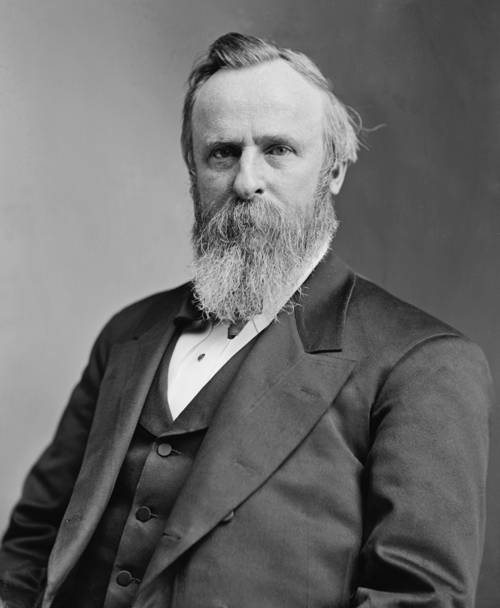
FAQ About Rutherford Hayes

Who was Rutherford B. Hayes?
Rutherford B. Hayes was the 19th President of the United States, serving from 1877 to 1881. He is best known for his role in ending the Reconstruction era following the Civil War and his efforts in civil service reform. Hayes was a member of the Republican Party and had previously served as a U.S. congressman and governor of Ohio.

What was the Compromise of 1877 and how did it affect Rutherford B. Hayes's presidency?
The Compromise of 1877 was an informal, unwritten agreement that resolved the disputed 1876 U.S. presidential election. In exchange for the withdrawal of federal troops from the South, effectively ending Reconstruction, Rutherford B. Hayes was awarded the presidency. This compromise marked the end of federal efforts to enforce civil rights for African Americans in the southern states, affecting his presidency by constraining his ability to support Reconstruction policies.

How did Rutherford B. Hayes contribute to civil service reform?
Rutherford B. Hayes was an advocate for civil service reform, aiming to eliminate the patronage system and ensure government positions were awarded based on merit. During his presidency, Hayes implemented merit-based hiring practices in certain federal agencies and worked to dismantle the patronage-based 'spoils system.' His commitment to reform laid the groundwork for the later Pendleton Civil Service Reform Act of 1883.

What were some significant achievements of Rutherford B. Hayes's presidency?
Significant achievements during Rutherford B. Hayes's presidency include his efforts towards civil service reform, as well as his work to restore trust and integrity in the federal government after the scandals of the Grant administration. Hayes also sought to reconcile divisions between the North and South and emphasized the importance of education and economic opportunities for African Americans, although federal support for these initiatives was limited.

Why is Rutherford B. Hayes considered a controversial figure in American history?
Rutherford B. Hayes is viewed as controversial primarily due to the manner in which he became president through the Compromise of 1877, which is believed by some to have resulted from a "corrupt bargain" that compromised African American civil rights. While some credit him for trying to restore integrity and make notable reforms, others criticize him for failing to support Reconstruction policies effectively.

What were Rutherford B. Hayes's views on Reconstruction?
Rutherford B. Hayes believed in the need for national reconciliation and supported a moderate approach to Reconstruction. He withdrew federal troops from the South, effectively ending the Reconstruction era. Hayes aimed for local control over Southern affairs, seeking to provide opportunities for African Americans through education and economic initiatives, yet he faced significant opposition and limitations, leading to a rollback of some civil rights advances.

How did Rutherford B. Hayes's presidency impact African American rights?
Rutherford B. Hayes's presidency had a mixed impact on African American rights. While he withdrew federal troops from the South, which resulted in the end of Reconstruction and diminished enforcement of civil rights for African Americans, he also advocated for black education and advancement. However, the absence of federal oversight led to the rise of discriminatory Jim Crow laws and increased racial tensions in the South.

What role did Rutherford B. Hayes play in the end of the Reconstruction era?
Rutherford B. Hayes played a pivotal role in ending the Reconstruction era through the Compromise of 1877, which facilitated his presidency in exchange for withdrawing federal troops from the South. This withdrawal marked the conclusion of Reconstruction, allowing Southern states to govern without federal intervention, often leading to the disenfranchisement and marginalization of African Americans.

What were Rutherford B. Hayes's policies towards Native Americans?
Rutherford B. Hayes advocated for policies that aimed to assimilate Native Americans into American society. He supported the idea of educational programs and the end of treaty-making with Native American tribes, although he sought peaceful solutions and discouraged violent confrontations. Nonetheless, his policies continued the trend of diminishing Native American autonomy and culture.

How did Rutherford B. Hayes address economic issues during his presidency?
During his presidency, Rutherford B. Hayes dealt with economic issues such as the national debt and the effects of the depression that followed the Panic of 1873. He attempted to improve the economy by advocating for the resumption of specie payments to strengthen the currency, and he vetoed inflationary policies that he perceived as harmful to economic stability.

What educational initiatives did Rutherford B. Hayes support?
Rutherford B. Hayes was a strong advocate for education, believing it was essential for the progress of both individuals and society. He supported federal funding for public schools and emphasized the need for educational opportunities for African Americans to aid in their social and economic advancement. His focus on education laid the foundation for continued public education reforms.

Did Rutherford B. Hayes have any military experience before becoming president?
Yes, Rutherford B. Hayes had an extensive military career before his presidency. He served as a major general in the Union Army during the American Civil War, where he was wounded several times in battle. His leadership and bravery earned him a reputation as a successful and respected officer.

How did Rutherford B. Hayes approach foreign policy?
Rutherford B. Hayes's foreign policy focused on avoiding military conflicts and developing trade relations. He prioritized peaceful resolutions to disputes, extended American influence in Latin America, and maintained neutrality during European conflicts. Hayes's administration also worked to strengthen the U.S. Navy to support national defense and commerce.

What were Rutherford B. Hayes's views on women's rights?
Rutherford B. Hayes held progressive views for his time on women's education and roles in society. He supported higher education opportunities for women and believed in their capacity to participate fully in educational and professional fields. However, he did not actively advocate for women's suffrage during his presidency.

Was Rutherford B. Hayes involved in any scandals during his presidency?
Rutherford B. Hayes's presidency was relatively scandal-free compared to his predecessors. Known for his integrity and commitment to reform, Hayes sought to restore public trust in the government following the numerous scandals of the Grant administration. His efforts to maintain ethical standards in his administration were generally successful in avoiding major controversies.

What legacy did Rutherford B. Hayes leave behind?
Rutherford B. Hayes left a complex legacy characterized by his dedication to reform and national unity, despite controversies surrounding his election and the impact on Reconstruction. He is remembered for restoring integrity to the presidency, advancing civil service reform, and promoting education. However, his presidency also marked the decline of Reconstruction efforts and setbacks in civil rights for African Americans.

How did Rutherford B. Hayes's presidency influence future civil service reforms?
Rutherford B. Hayes's emphasis on reforming the civil service to curb corruption and establish merit-based appointments influenced future legislation. His administration's initiatives inspired the eventual passage of the Pendleton Civil Service Reform Act of 1883, which institutionalized many of the principles Hayes championed, such as competitive exams and protected jobs from political influence.

Did Rutherford B. Hayes have a family, and who was his spouse?
Yes, Rutherford B. Hayes was married to Lucy Webb Hayes. Together, they had eight children, though only five survived to adulthood. Lucy Hayes was an influential First Lady, known for her advocacy of the temperance movement and for being the first First Lady to have a college degree. She was fondly referred to as "Lemonade Lucy" due to her ban on alcoholic beverages in the White House.

What personal interests and hobbies did Rutherford B. Hayes have?
Rutherford B. Hayes had a variety of personal interests and hobbies, including reading, traveling, and an interest in education and learning. He maintained a lifelong dedication to promoting education and often spoke about its importance in society. Hayes was also known to enjoy outdoor activities, such as fishing and hunting.

How did Rutherford B. Hayes's early life and career prepare him for the presidency?
Rutherford B. Hayes's early life and career were marked by significant legal, military, and political experiences that equipped him for the presidency. He graduated from Kenyon College and Harvard Law School, and worked as a lawyer and city solicitor in Cincinnati, Ohio. Hayes served as a Union Army officer with distinction during the Civil War and later as a U.S. Congressman and Governor of Ohio, where he gained valuable political and administrative experience.
